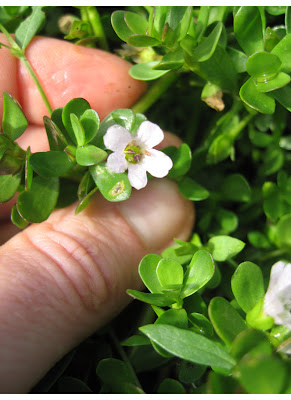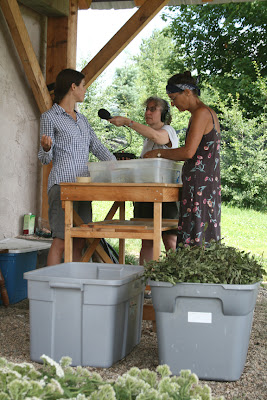Farm to Pharmacy is an innovative internship program that takes place at Goldthread Herb Farm and Apothecary in the foothills of the Berkshire Mountains in western Massachusetts. Goldthread offers interns the rare opportunity to learn fundamentals of both traditional medicine and plant cultivation side by side. Synthesizing Chinese, Ayurvedic and Western herbal traditions, our educational offerings are a comprehensive compliment to the abundance of time spent outdoors. We welcome herbal medicine students from all walks of life and are happy to facilitate college credit where possible.
During this experiential seven-month program, students divide their day at Goldthread’s organic herb farm between classes in herbal theories and supervised work with the plants in over 3 acres of fields. Educational herb walks in the learning garden to practice identification and discuss botanical characteristics will compliment lectures and coursework. Subjects range from the major classifications and their specific healing properties to the medicinal applications for a wide variety of medical conditions.
Over the course of the growing season interns will participate in all aspects of plant cultivation from preparing beds and planting seeds through to harvest and beyond. Interns will learn to process and prepare herbal medicines transforming freshly harvested flowers, leaves and roots into tinctures, syrups, teas, salves, elixirs and oils for our apothecary.
Educational and life changing, the internship offers participants the chance to play a pivotal role in the Grassroots Healthcare Revolution. Find unparalleled communion with the medicinal plants themselves as well as a community that emphasizes sustainable, non-toxic and cost effective healthcare grounded in organic agriculture and empowered self-care for all.
Upon completion of the program, interns come away with an extensive understanding of the theories of herbal healing, the agricultural training to cultivate the major medicinal herbs in their own space, and the practical skills to apply their new knowledge and begin healing themselves and others.
Dates: Wednesdays 9-4, April 17th -October 9.
Tuition for this experiential 7 month program is $1950. Save 10% by paying early (by February 15th), paying in full, or signing up with a friend — you can both take 10% off! Sorry, these offers can not be combined.
Dates: Wednesdays 9-4, April 17th -October 9.
Tuition for this experiential 7 month program is $1950. Save 10% by paying early (by February 15th), paying in full, or signing up with a friend — you can both take 10% off! Sorry, these offers can not be combined.
Work study is available and will begin on March 15.
Payment plans are also available!
Full details at: www.goldthreadapothecary.com
Payment plans are also available!
Full details at: www.goldthreadapothecary.com





















































